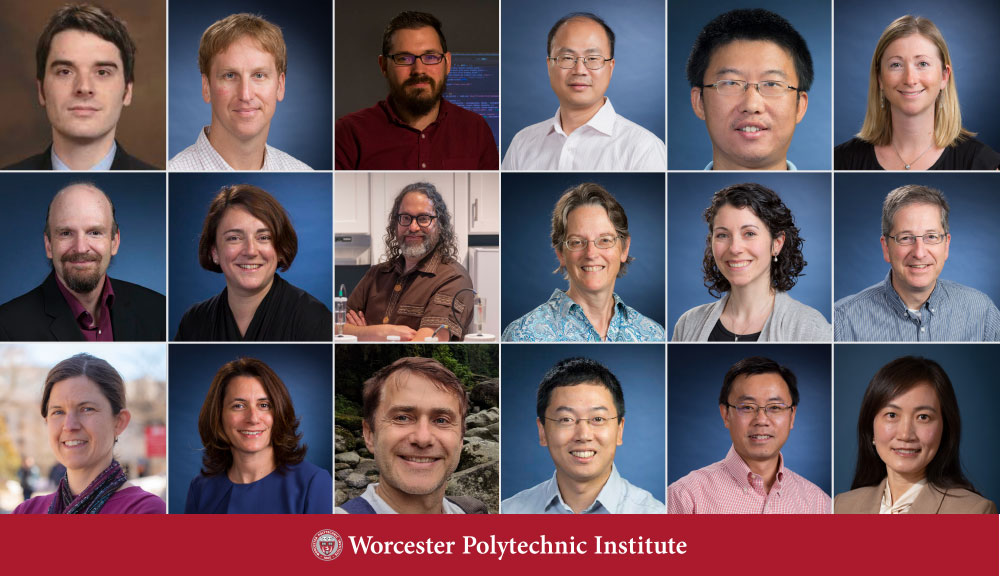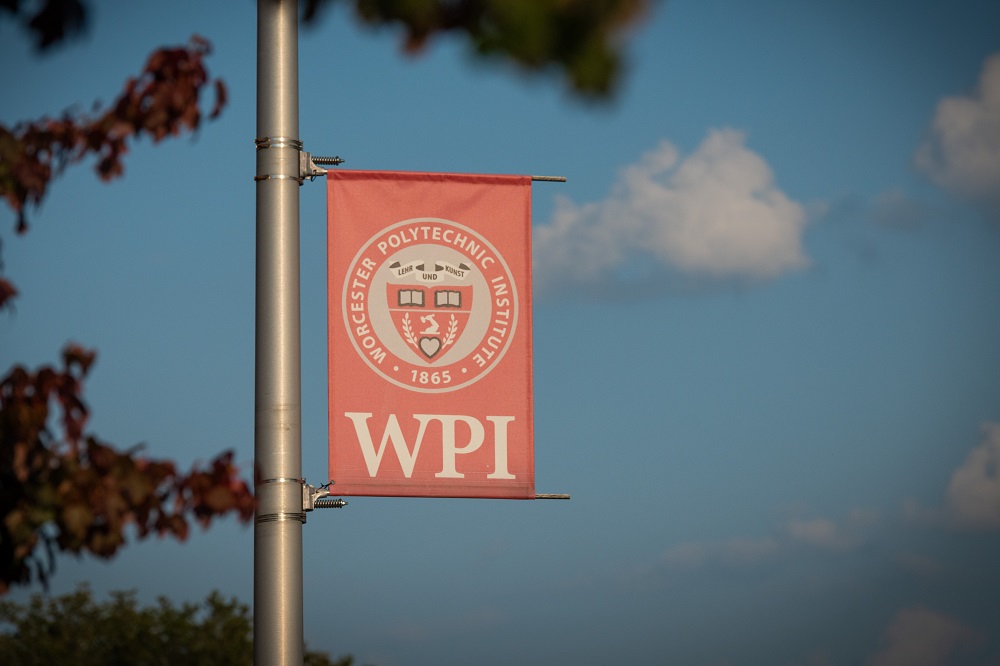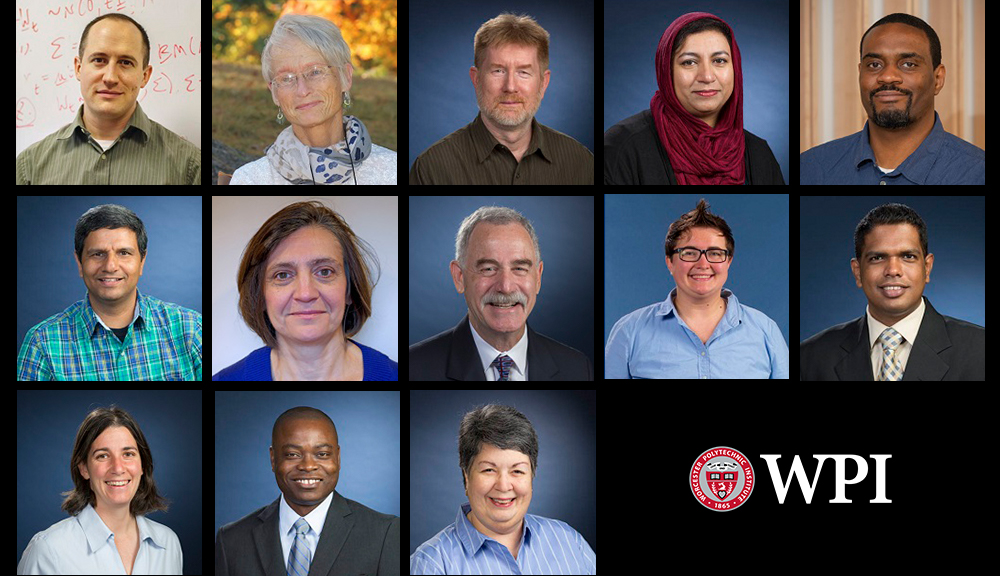Ten members of the Worcester Polytechnic Institute (WPI) faculty have been promoted in academic rank; in addition, 10 faculty members, including eight of those who were promoted, have been granted tenure.
"It is especially gratifying to be able to award tenure and promotion to such a large and distinguished group of scholars and teachers," said WPI President Dennis Berkey. "We are proud of all they have accomplished as educators, researchers, and leaders in their respective fields and in our community. On behalf of the Board of Trustees, I extend to each of them our congratulations and our gratitude."
Tanja Dominko, associate professor of biology and biotechnology, has been granted tenure. Dominko leads a research team at WPI that is investigating novel techniques for regenerating tissue for therapeutic applications. With funding from the Department of Defense’s Defense Advanced Research Projects Agency (DARPA) and the National Institutes of Heath—including an inaugural NIH EUREKA (Exceptional, Unconventional Research Enabling Knowledge Acceleration) award—she has helped develop methods for transforming adult cells into a stem-like state. In recently published research, her team was able to regenerate functional muscle tissue using these transformed cells. Dominko holds two master of science degrees, including one in large animal reproduction and obstetrics, along with a doctorate in veterinary medicine (DVM) from the University of Ljubjlana in Slovenia and a PhD in endocrinology and reproductive physiology from the University of Wisconsin-Madison.
Joseph Farbrook has been promoted to associate professor of humanities and arts and granted tenure. Farbrook, who teaches in WPI’s Interactive Media & Game Development program, is a digital artist whose work explores the intersections between video, video games, and sculpture. He is currently working with 3D video game engines to create virtual installation art, audio sculpture, Machinima, and hypertext narratives based in virtual environments. Farbrook has exhibited his work extensively in the United States, in Central and South America, and in Europe. In 2010, his interactive installation Strata-Caster was presented at the 37th annual SIGGRAPH conference on computer graphics and interactive techniques. He earned a bachelor of arts degree in creative writing and an MFA in media arts at the University of Colorado in Boulder.
Michael Gennert has been promoted to full professor of computer science. Gennert also directs WPI’s pioneering undergraduate program in robotics engineering. In his research, he focuses on computer imaging, visualization, and simulation in medical imaging. For example, with more than $1 million in funding from the National Institutes of Health, Gennert and his research team have developed techniques for using a visual tracking system to compensate for artifacts introduced into medical images by patient motion, particularly in systems like SPECT (single-photon emission computed tomography) and PET (positron emission tomography), which require patients to remain motionless for long periods of time. Gennert, who joined the WPI faculty in 1987, has published more than 35 referred publications and invited conference papers. He holds a bachelor of science degree and a doctorate in electrical engineering and computer science and a master of science in electrical engineering from MIT.
Janice Gobert, associate professor of social science and policy studies, has been granted tenure. A cognitive scientist, Gobert, who co-directs WPI’s graduate program in learning sciences and technologies, develops technology for enhancing science education. Having been principal or co-principal investigator on federal research awards totaling nearly $17 million, she has studied the importance of visualizations and simulations in science learning and has built on that work to develop an intelligent tutoring system that uses microworlds—rich visual simulations of natural phenomena—that teach students to formulate hypotheses, design experiments, and evaluate their results as scientists do. The system also tracks how well students are learning science concepts and developing the skills of scientific inquiry. Gobert holds a BA in psychology from Laurentian University, in Ontario, an MA in educational psychology and cognitive science from McGill University, in Montreal, and a PhD in cognitive science from the University of Toronto.
Diana Lados has been promoted to associate professor of mechanical engineering and granted tenure. The founder of the Integrative Materials Design Center at WPI, Lados conducts fundamental and applied research in the areas of metal fatigue, fatigue crack growth, and fracture. She recently received a five-year CAREER Award from the National Science Foundation for a study aimed at developing a fundamental understanding of fatigue crack initiation and propagation, work that could lead to greater use of light metals in transportation applications and a concomitant reduction in energy use and carbon emissions. Lados has received numerous honors for her research and teaching, including the 2011 Early Career Faculty Fellow Award from TMS (The Minerals, Metals and Materials Society) and invitations to participate in National Academy of Engineering symposia on exceptional engineering research and innovative education. She received BS and MS degrees in mechanical engineering from Polytechnic University of Bucharest, an MS in mechanical engineering from Southern Illinois University at Carbondale, and a PhD in materials science and engineering from WPI.
Jianyu Liang has been promoted to associate professor of mechanical engineering and granted tenure. The director of the Nanomaterials and Nanomanufacturing Laboratory at WPI, Liang conducts research in the areas of nanoscience, nanofabrication, and nanomanufacturing and has explored applications of nanomaterials in batteries and power sources and in magnetic nanodots and nanowires for information storage and computing. With funding from the National Science Foundation and NASA, she has developed processes for nanofabrication assisted by anodized aluminum oxide templates, work that has led to new ways to fabricate biomaterial nanotubes and nanofibers, carbon nanofibers, and metal nanowires. Liang earned a BS and an ME in physical chemistry at Central South University in China and a PhD in electrical engineering at Brown University.
Marcus Sarkis Martins has been promoted to full professor of mathematical sciences. A member of the WPI faculty since 1998, Sarkis Martins conducts research on the design, analysis, and implementation of fast parallel algorithms for the numerical solution of large systems of equations. This work has applications in a wide range of fields in science and engineering, including aerodynamics, electrodynamics, materials science, and multiphase flows. In 1995 he received a National Science Foundation CAREER Award to develop new discretization schemes and fast iterative solvers for the solution of complex materials science problems. Since then, with more than 50 peer-reviewed publications and conference papers and more than 60 invited presentations around the world, he has earned a reputation as an established leader in his field. He holds a BS in engineering of infrastructure aeronautics from Instituto Technologico de Aeronautica and an MS in mathematics from Pontificia Universidae Catolica do Rio de Janeiro, both in Brazil, and a PhD in mathematics from the Courant Institute of Mathematical Sciences at New York University.
Reeta Prusty Rao has been promoted to associate professor of biology and biotechnology and granted tenure. In her research, Prusty Rao works to understand and ultimately manage fungal diseases, particularly those caused by Candida albicans, which is responsible for everything from diaper rash to deadly blood infections suffered by immune-compromised individuals. In this work, she uses biochemical, molecular genetic, genomic, and behavioral tools. She has also conducted research in the area of biofuels, particularly the generation of bio-butanol from cellulosic feedstock. Prusty Rao was recently named a member of the Center for AIDS Research at the University of Massachusetts Medical School and a visiting scientist at the Broad Institute at Massachusetts Institute of Technology and Harvard University. She received a BS in pharmacy from Birla Institute of Technology and Science in India, MS degrees in bioscience and biotechnology and environmental science from Drexel University, and a PhD in biochemistry and molecular biology from Penn State University Medical College.
Ali Rangwala has been promoted to associate professor of fire protection engineering and granted tenure. In the Combustion Laboratory, which he directs, Rangwala conducts laboratory studies aimed at better understanding basic fire phenomena, including the ignition and propagation of dust explosions, particularly those caused by the accumulation of coal dust. In 2009 he received a five-year NSF CAREER Award to conduct a fundamental study of the physics of dust explosions, including the role of such factors as the size of dust particles, their chemical make-up, and the density of dust clouds. Rangwala also studies velocity measurement of fire-induced flows and flame spread on solid and liquid fuels. He earned a BS in electrical engineering at the Government College of Engineering in Pune, India, an MS in fire protection engineering from the University of Maryland, and a PhD in mechanical and aerospace engineering from the University of California, San Diego.
Thomas Robertson has been promoted to associate professor of humanities and arts and granted tenure. A historian, Robertson studies American environmental history, the history of American foreign relations, and 20th century America, with a particular focus on America’s relations with the developing world. He has studied the history of Nepal and the role of American development projects there, work that was augmented by a Fulbright Scholar grant he received in 2009 to conduct research in Nepal. He has also engaged in scholarship on post-World War II American debates about population growth; his new book on this topic, The Malthusian Moment: Global Population Growth and the Birth of American Environmentalism, has been hailed as a key contribution to the ongoing debate about population growth and its impact on the worldwide environment. He holds a BA in political theory from Williams College and an MA and a PhD in U.S. environmental history from the University of Wisconsin, Madison.
Alexander Wyglinski has been promoted to associate professor of electrical and computer engineering and granted tenure. Founder of the Wireless Innovation Laboratory at WPI, Wyglinski conducts research on wireless communications and dynamic spectrum access. The goal of this work is to expand the use of the limited radio spectrum for the increasing number of wireless users and applications. He has conducted research on the current utilization of the spectrum and on technologies, including cognitive radio and software-defined radio, that may permit the opportunistic use of underused spectrum. Co-editor of the 2009 book Cognitive Radio Communications and Networks: Principles and Practice, Wyglinski was also co-author of a study that received the Gold Award for the best paper on communications presented at the 2011 IEEE Pacific Rim Conference on Communications, Computers, and Signal Processing. He earned a BS and a PhD in electrical engineering at McGill University in Montreal and an MS in electrical engineering at Queens University in Kingston, Ontario.
Hong Susan Zhou has been promoted to associate professor of chemical engineering and granted tenure. Conducting research in microfabrication and nanotechnology for biomedical, energy, and environmental applications, Zhou is currently developing biosensors based on aptamer (oligonucleic acid or peptide molecules that bind to specific target molecules) and gold nanoparticles. In this work, which has been supported by more than $700,000 in external awards, primarily from the National Science Foundation, she employs magnetism to elegantly couple nanomaterials with microfluidics to engineer a new generation of sensing microsystems that support ultrasensitive detection of targeted biological agents. The work could lead to devices that could be used for disease diagnosis, drug screening, and forensic applications. Zhu received a BS in chemical engineering from Hauzhong University of Science and Technology in China, an MS in chemical engineering from Clarkson University, and a PhD in chemical engineering and materials science from the University of California, Irvine.



